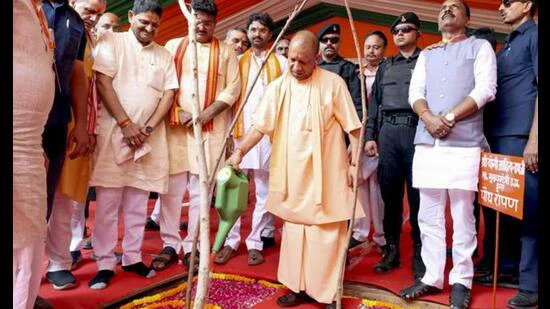GORAKHPUR Chief minister Yogi Adityanath on Tuesday urged people to shed the “slave mindset” and emphasised the need for an education system rooted in Indian values, culture and devotion to the nation.
He asserted that education is the key to building a self-reliant India.
He emphasised that prosperity depends first on education, followed by health, agriculture, water resources, skill development, employment and environmentally balanced development.
“(Earlier) a tendency had cropped up, and the slave mindset had engulfed the country in such a way that every Indian started feeling that an Indian should be looked down upon, while a foreigner should be looked (up) from the affluence (‘sampannata’) point of view. You have seen that this bad tendency has been curtailed in the past 11 years,” the CM said.
Addressing a gathering in Basti district after laying the foundation of Saraswati Shishu Mandir and performing its ‘bhoomi pujan’, the CM said Nanaji Deshmukh had initiated the establishment of Saraswati Shishu Mandirs from Gorakhpur with the vision of ensuring not just literacy but holistic development of children.
Adityanath noted that while the government designs curricula, Saraswati Shishu Mandirs advance their mission without state support, relying on the dedication of volunteers inspired by ‘Bharatiyata’.
The CM said while Congress imposed Article 370 in 1952 despite Dr BR Ambedkar’s opposition, Prime Minister Narendra Modi fulfilled Dr Syama Prasad Mukherjee’s vision by ensuring the complete integration of J&K under Indian law, ending terrorism and anti-India conspiracies.
“In 1953, Dr Mukherjee strongly opposed the idea of two constitutions, two flags and two prime ministers in one country. He advocated for the application of Indian law in Kashmir and even sacrificed his life for this cause,” he said.
Highlighting the contribution of Maharaja Suheldev, the CM said: “Around a thousand years ago, when Salar Masud came to Bahraich to destroy temples, Maharaja Suheldev fought against him, defeated him. But people forgot Suheldev and instead began venerating Masud. Our government has built a grand memorial for Suheldev in Bahraich and established a university in Azamgarh to honour him.”
Adityanath also reiterated Prime Minister Modi’s call for “vocal for local,” urging people to prioritize Made in India products, especially those crafted by Indians. He described social media as today’s battlefield and recalled how teachers used virtual classes effectively during the Covid-19 pandemic. He also cautioned against the careless use of artificial intelligence, urging responsible adoption.
The CM emphasized that the goal of every citizen should be to contribute to a developed India. “For India to progress, Uttar Pradesh and Basti must move ahead, and every village and town must witness development. This transformation is possible through teamwork, following the principle of ‘Sabka Saath, Sabka Vikas,'” he said.
Highlighting employment initiatives, Yogi Adityanath said the perception of UP had undergone a remarkable change. In Lucknow alone, 6,000 youth received government job appointment letters in just two days. Since 2017, around 8.5 lakh youth were appointed to government positions, including many from Basti in police, women and child development services and other sectors.
‘Divyangjan can emerge as valuable contributors’
Chief minister Yogi Adityanath said differently-abled persons (divyangjan) possess immense hidden talent, which only requires proper guidance to be nurtured. He emphasised that despite physical challenges, God has blessed them with unique abilities, and with society’s support, they can emerge as valuable contributors.
He was addressing the closing ceremony of a three-day free artificial limb transplant camp. Praising the initiative, he said distributing artificial limbs and assistive devices to divyangjan reflects true compassion and is one of the greatest forms of service to God. He also described it as the highest tribute to ancestors during Pitra Paksh.
During the event, calipers, wheelchairs and tricycles were distributed to beneficiaries. The CM noted that such initiatives reflect social responsibility and, if emulated by others, would empower marginalized communities, strengthening unity and nationalism.
